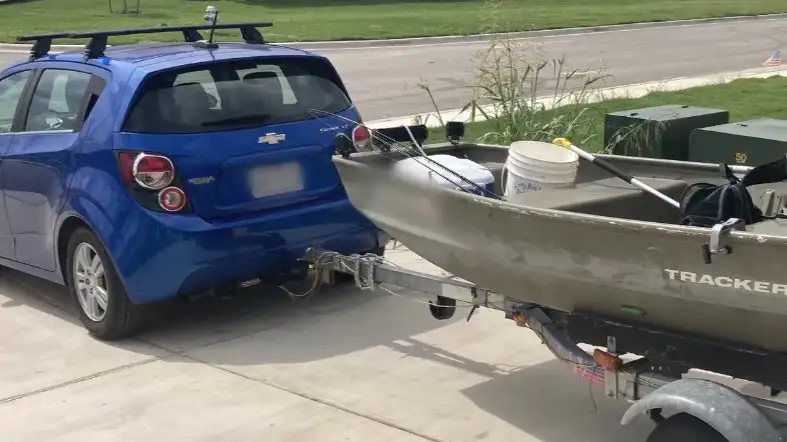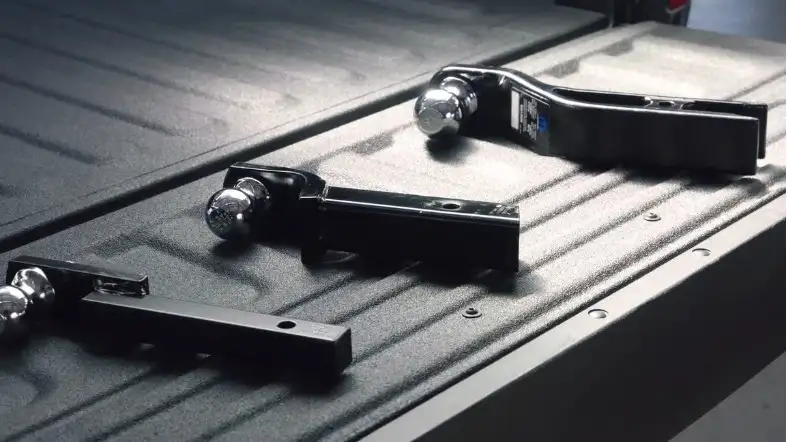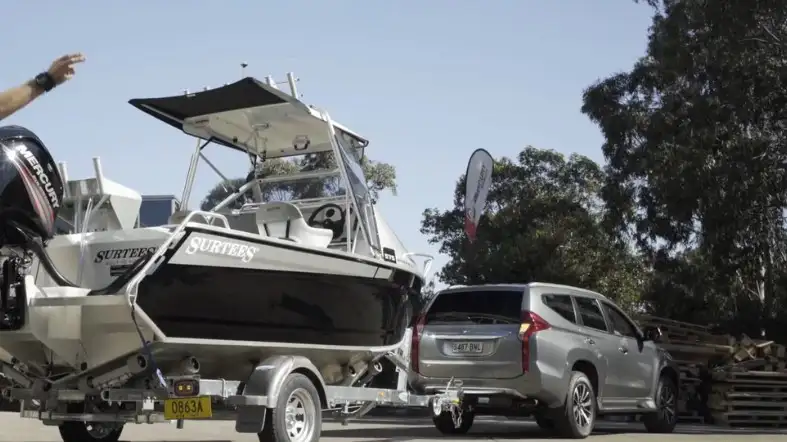There are a few different types of trailer hitches available on the market, and each has its own benefits and drawbacks.
When choosing a hitch for towing a boat, it’s important to select the right one for your needs.
Here is a brief overview of the best classes of trailer hitches suited for boats.
Which Class Of Trailer Hitch Is Best Suited For A Boat
The best size receiver hitch for a boat is typically a Class III trailer hitch.

This type of hitch is designed to be able to tow heavier loads and can accommodate up to 8,000 pounds of tongue weight, making it the ideal choice for towing a boat.
It also comes with a 2-inch x 2-inch square receiver opening, which allows for the installation of many different kinds of accessories that are often used when attaching and pulling a boat trailer.
These accessories could include safety chains and ball mounts that help to secure and stabilize the load while in transit.
When installing this type of receiver hitch, it’s important to use a heavy-duty grade 8 bolt with an oxidation-resistant finish so that it can withstand the elements and remain reliable season after season.
There is a comparison table on types of trailer hitches given below,
| Trailer Hitch Class | Weight Rating | Tongue Weight Rating | Examples of Use |
|---|---|---|---|
| Class I | Up to 2,000 lbs | Up to 200 lbs | Small utility trailers, small boat trailers |
| Class II | Up to 3,500 lbs | Up to 350 lbs | Medium boat trailers, small camping trailers |
| Class III | Up to 8,000 lbs | Up to 800 lbs | Large boat trailers, medium to large camping trailers, fifth wheel trailers |
How To Choose The Right Class Of Trailer Hitch For My Boat?

There are several factors to consider when choosing a trailer hitch for your boat, including the weight and size of your boat, as well as the types of roads and terrain you typically encounter while towing it.
1. Determine the weight of your boat.
The first step in choosing the right class of trailer hitch for your boat is to determine the weight of your boat.
The weight of your boat will determine the amount of weight that the hitch will need to be able to support.
2. Decide what type of trailer you will be using.
The next step in choosing the right class of trailer hitch for your boat is to decide what type of trailer you will be using.
There are two main types of trailers that boats can be towed with – open trailers and enclosed trailers.
Open trailers are typically less expensive, but they offer less protection for your boat.
Enclosed trailers are more expensive, but they offer more protection for your boat from the elements.
3. Choose a hitch.
Once you have determined the weight of your boat and the type of trailer you will be using, you can then choose a hitch that is rated for a higher weight than the weight of your boat.
This is important because you want to make sure that the hitch can safely support the weight of your boat.
4. Consider the features of different hitches.
When you are choosing a hitch for your boat, you should also consider the features of different hitches.
Some hitches come with features that can make towing your boat easier, such as anti-sway bars or built-in brake controllers.
These features can help to make towing your boat safer and easier, so they are definitely worth considering.
5. Choose a hitch that is easy to install and use.
Finally, when you are choosing a hitch for your boat, you should also make sure that it is easy to install and use.
You don’t want to choose a hitch that is difficult to install or use, as this could make towing your boat more difficult and dangerous.
Tips to Use Trailer Hitch for My Boat

There are several tips that you can use when using your trailer hitch to tow your boat.
These include:
1. Get the Right Size
The first step is to make sure you get the right size hitch for your boat.
The last thing you want is for your trailer to come loose while you’re driving down the road.
You can determine the right size hitch by looking at the capacity of your trailer and comparing it to the weight of your boat.
2. Attach the Trailer to the Hitch
Once you have the right size hitch, it’s time to attach the trailer to it.
This process will vary depending on the type of hitch you have, but in general, you’ll need to connect the trailer’s coupler to the hitch ball.
Make sure that the coupler is properly secured to the hitch ball before proceeding.
3. Adjust the Trailer’s Brakes
After attaching the trailer to the hitch, you’ll need to adjust its brakes.
This is important because it will ensure that your trailer doesn’t roll away while you’re driving.
To adjust the brakes, you’ll need to turn a knob or lever on the brake controller until they’re tight enough.
4. Connect the Wiring Harness
In order for your trailer’s lights to work, you’ll need to connect its wiring harness to your vehicle’s electrical system.
This process will vary depending on your vehicle, but in general, you’ll need to connect the positive and negative wires to their respective terminals.
Once everything is connected, turn on your vehicle’s headlights and make sure that all of the lights on your trailer are working properly.
5. Test Everything Before You Go
Before hitting the road, it’s important to test everything one last time.
This includes making sure that all of the lights are working properly, that the brakes are adjusted correctly, and that the hitch is secure.
Once you’ve done all of this, you’re ready to hit the open road with your boat in tow!
FAQs about the best classes of trailer hitches suited for boats.
What Is The Difference Between Class I, II, And III Trailer Hitches?
Class I trailer hitches are the lightest duty option and are typically used for smaller trailers such as pop-up campers or utility trailers.
Class 2 trailer hitches are medium duty and can be used for larger trailers such as travel trailers or boat trailers.
Class III trailer hitches are the heaviest duty option and can be used for very large trailers such as fifth wheel trailers or gooseneck trailers.
How Do I Know Which Class Of Hitch I Need?
The first step is to determine the weight of your trailer.
This information can typically be found in the owner’s manual or on the manufacturer’s website.
Once you know the weight of your trailer, you can choose a hitch that has a maximum capacity that is greater than the weight of your trailer.
For example, if your trailer weighs 4,000 pounds, you would need a hitch with a maximum capacity of at least 4,000 pounds.
What Other Factors Should I Consider When Choosing A Hitch?
In addition to weight, you will also want to consider the size and type of trailer you have.
For example, if you have a large travel trailer, you may need a class III hitch in order to provide enough stability.
If you have a smaller pop-up camper, a class I hitch may be sufficient.
You will also want to make sure that the hitch you choose is compatible with your vehicle.
Some hitches require special mounting brackets or other hardware that may not be compatible with your vehicle.
Where Can I Find More Information On Choosing The Right Hitch For My Vehicle?
Your local U-Haul dealer would be happy to help you choose the right hitch for your vehicle and provide any additional information or resources you may need.
You can also find more information on our website at www.uhaul.com/hitches.
How Do I Install My Trailer Hitch?
Installing a trailer hitch is a relatively simple process, but it is always best to consult with an expert before attempting to do it yourself.
Your local U-Haul dealer would be happy to install your hitch for you.
Conclusion
So, if you’re in the market for a receiver hitch to tow your boat, a Class III trailer hitch is likely your best option.
It can handle heavier loads and comes with a square receiver opening that allows for the installation of many different types of accessories.
When installing this type of hitch, be sure to use a heavy duty grade 8 bolt with an oxidation resistant finish.
